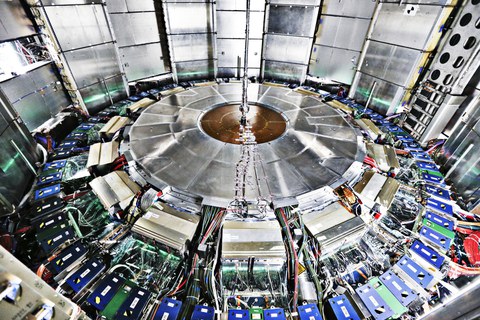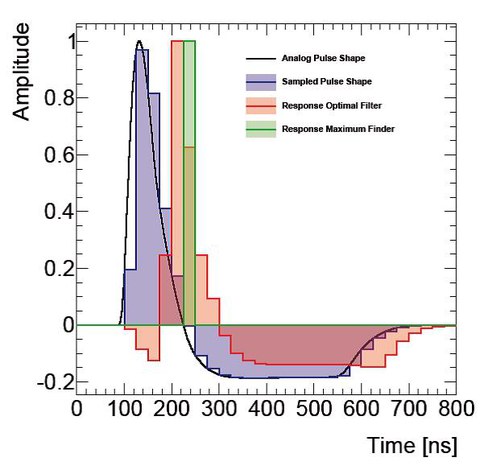Lehramtsarbeiten
Wissenschaftsvermittlung
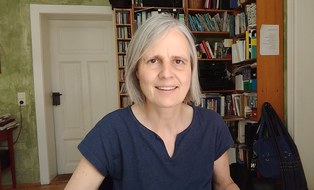 © IKTP
© IKTP
Group leader
NameDr. Uta Bilow
Science communication
Send encrypted email via the SecureMail portal (for TUD external users only).
Institute of Nuclear and Particle Physics
Visiting address:
Andreas-Schubert-Bau, EG, Raum E24 Zellescher Weg 19
01069 Dresden
Gemeinsam mit den beim ATLAS Experiment arbeitenden Forschungsgruppen des Instituts bieten wir derzeit folgende Themen für Master- oder Staatsexamensarbeiten des Lehramts Physik an:
Ziel ist es, die Forschung zum Klimawandel mit der Teilchenphysik durch die Auseinandersetzung mit dem CLOUD-Experiment am CERN (siehe 1 und 2) in einer Unterrichtseinheit zu verknüpfen. Dies hat das Potenzial, die Kreativität, das kritische Denken und das Verständnis für die Natur der Wissenschaft bei den Schüler:innen zu fördern und ihr Verständnis der Teilchenphysik durch deren Anwendung in einem realen Kontext zu vertiefen. Die Unterrichtseinheit soll mit einer kleinen Gruppe von Schüler:innen erprobt werden. Die Arbeit soll in Kooperation mit der Didaktik der Physik erstellt werden (Kontakt: Dr. Farahnaz Sadidi, ).
(1) https://www.home.cern/science/experiments/cloud
(2) https://cerncourier.com/a/cloud-experiment-sharpens-climate-predictions/
Kontakt:
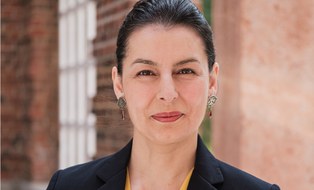 © Tine Jurtz
© Tine Jurtz
wissenschaftliche Mitarbeiterin
NameDr. Farahnaz Sadidi
Betreuung Praktikumsveranstaltungen, Seminar kritisches Denken
Professur für Didaktik der Physik
Professur für Didaktik der Physik
Büro:
Recknagel-Bau, B305 Haeckelstraße 3
01069 Dresden
None
Office hours:
Sprechzeiten nach Vereinbarung per E-Mail
Für die Vorbereitungsphase der Messaufgaben der Teilchenphysik-Masterclasses an Schulen sollen entwickelt werden:
- Prototyp für die Visualisierung der Funktionsweise des ATLAS-Detektors für eine Aktivierungsphase im Rahmen einer Teilchenphysik-Masterclass
- Erstellung einer Animation zur Vermittlung des Konzepts des fehlenden transversalen Impulses
Kontakt:
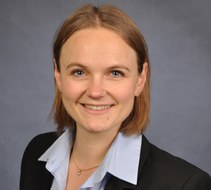 © Salome Flegr
© Salome Flegr
Juniorprofessorin
NameJun.-Prof. Dr. Salome Flegr
Send encrypted email via the SecureMail portal (for TUD external users only).
Professur für Didaktik der Physik
Professur für Didaktik der Physik
Büro:
Recknagel-Bau, B110 Haeckelstraße 3
01069 Dresden
None
Mitgestaltung und Weiterentwicklung des ATLAS Open Data Portal am CERN (http://opendata.cern.ch/) mit folgenden Aufgaben zur Auswahl:
- Mitarbeit und Aufbereitung der Dokumentation zum ATLAS Datensatz
- Implementierung neuer Inhalte im Open data Portal (nur für Programmier-Profis)
- Entwicklung neuer Ideen für die Darstellung von Lerninhalten auf dem Open Data Portal
Die Arbeit soll in Kooperation mit der Didaktik der Physik erstellt werden (Kontakt: Jun.-Prof. Flegr, ).
Kontakt:
 © Salome Flegr
© Salome Flegr
Juniorprofessorin
NameJun.-Prof. Dr. Salome Flegr
Send encrypted email via the SecureMail portal (for TUD external users only).
Professur für Didaktik der Physik
Professur für Didaktik der Physik
Büro:
Recknagel-Bau, B110 Haeckelstraße 3
01069 Dresden
None
Im Netzwerk Teilchenwelt wurde umfangreiches Unterrichtsmaterial zur Teilchenphysik erstellt. Die Erkenntnisse des Standardmodells werden darin mithilfe des Konzepts von Ladungen und Wechselwirkungen beschrieben. Dieser Ansatz, der sich in der populärwissenschaftlichen Literatur und in Schulbüchern bislang kaum widerspiegelt, soll durch geeignete Arbeitsblätter ergänzt werden.
Diese Arbeit soll in Kooperation mit der Didaktik der Physik erstellt werden.
Kontakt:
 © Salome Flegr
© Salome Flegr
Juniorprofessorin
NameJun.-Prof. Dr. Salome Flegr
Send encrypted email via the SecureMail portal (for TUD external users only).
Professur für Didaktik der Physik
Professur für Didaktik der Physik
Büro:
Recknagel-Bau, B110 Haeckelstraße 3
01069 Dresden
None
Experimentelle Teilchenphysik
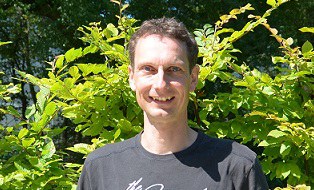 © IKTP
© IKTP
Group leader
NameProf. Dr. Arno Straessner
Experimental particle physics
Send encrypted email via the SecureMail portal (for TUD external users only).
Institute of Nuclear and Particle Physics
Visiting address:
Andreas-Schubert-Bau, 4. OG, Raum 428 Zellescher Weg 19
01069 Dresden
Bachelor Thesis, Research Studies Master, Master Thesis in Experimental Particle Physics
- Multivariate analysis, machine learning and artificial intelligence
- Optimisation of data analyses for particle searches and reconstruction of particle decays
- Application and development of software for statistical data analysis
One of the research activities of the ATLAS group at the Institute of Nuclear and Particle Physics is the search for new Higgs bosons in extensions of the Standard Model at the Large Hadron Collider (LHC). A large data set is available from ATLAS Run-2 and Run-3 with a total luminosity of 200 fb-1, which can be analysed. More data are currently being recorded by ATLAS.
In many scenarios beyond the Standard Model, the decay of the new Higgs bosons is into a pair of tau leptons. We therefore study the hadronic decay of such tau leptons in detail, in particular, to obtain a high significance for the Higgs signal, and a large suppression of backgrounds.
In the data analyses, we exploit advanced statistical methods and very often apply methods of machine learning to optimize the selection algorithms or parameter settings.
The topics of the Bachelor and Master theses will be defined individually according to your interest and to the current state of research.
In the thesis project, you will learn software-based methods of data analysis and statistics, the application of machine learning tools, and the use of modern particle detectors.
You should bring a basic knowledge of particle physics. Programming skills would be an asset, but we will also provide introductory sessions to all necessary programming and analysis tools.
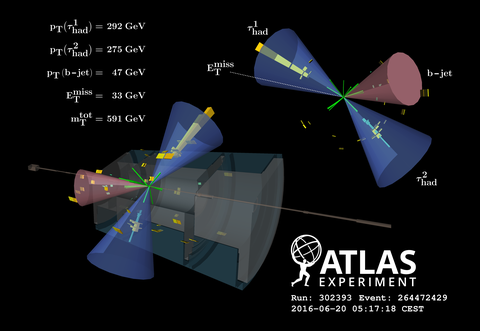
pp collision event recorded by the ATLAS detector at the LHC. The picture shows a candidate of a supersymmetric Higgs boson decay into a pair of tau leptons.
Bachelor Thesis, Research Studies Master, Master Thesis in Experimental Particle Physics
- Machine learning und artificial neural networks
- Optimisation of the energy measurement of photons, electrons and hadronic jets with Liquid-Argon calorimeters
- Programming or simulation of electronic and digital signal processing
- Statistical analysis of measurement data
The Liquid-Argon Calorimeters (LAr Calorimeters) of the ATLAS detector at the LHC are going to be upgraded with new readout electronics for operating at highest LHC luminosities. The calorimeter signals shall be reconstructed with improved energy and spatial resolution so that particles produced in proton-proton collisions can be identified with higher precision. The goal is, for example, an improved detection of Higgs boson decays with the ATLAS detector.
The particle identification and energy reconstruction must be performed in real-time, and the time to provide the energy calculation in each detector cell must not take longer than 0.5 μs. For this reason, we use modern and fast programmable electronic circuits, so-called Field Programmable Gate Arrays (FPGAs) for signal reconstruction. We exploit deep learning methods and artificial intelligence to optimize our measurements.
In the Bachelor or Master thesis, the energy reconstruction of the ATLAS LAr Calorimeters shall be improved using machine learning approaches.
In the research project, you will learn the application of machine learning tools (e.g. keras), software-based data analysis, and the functioning of a modern particle detector and electronic readout systems.
If you are interested you may also learn about programming of FPGAs using the programming language VHDL. You can get involved in the application of machine learning algorithms or on advanced data processing procedures running on FPGA devices.
You should bring a basic knowledge of particle physics, and the motivation to learn more about machine learning and/or FPGA programming. Basic programming skills are an asset. We also provide introductory sessions to VHDL and the analysis tools needed for your work.
Strahlungsphysik
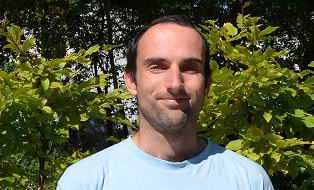 © IKTP
© IKTP
Group leader
NameMr Dr. Thomas Kormoll
Strahlungsphysik
Send encrypted email via the SecureMail portal (for TUD external users only).
Institute of Nuclear and Particle Physics
Visiting address:
Andreas-Schubert-Bau, 4. OG, Raum 406 Zellescher Weg 19
01069 Dresden
Insbesondere für Lehramtsstudierende bietet die Arbeitsgruppe Abschlussarbeiten an. Hier wird vor allem darauf Wert gelegt, experimentelle Erfahrungen auch außer Haus zu vermitteln, die Sie als Lehrender an die Schüler weitergeben können.
- Dosimetrie in medizinischen Anwendungen
- Strahlenschutz
- Entwicklung von Messgeräten und -verfahren

